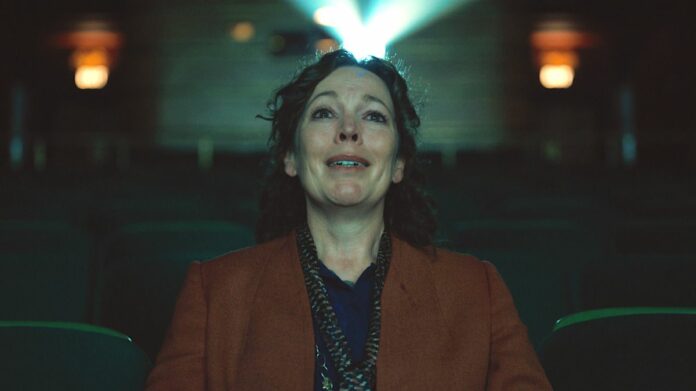Sam Mendes’ quiet and contemplative “Empire of Light” is about many things, and that is the problem. The film is unsure of what it wants to focus on throughout. What starts out as a simple love story between two people who can’t quite fit in with the world changes into a strange reflection on the idea of the “hysterical woman,” peppered with a half-hearted commentary on racial violence in England. Olivia Coleman and Michael Ward are the biggest strengths, along with cinematographer Roger Deakins.
The story is set in 1980–1981 and is about a lonely woman, Hilary Small (Olivia Coleman), who works as the manager of the Empire cinema in Margate, England. She spends all of her time alone—eating, walking, and working—apart from the brief moments of forced banter with the cinema staff and crude, secret sexual encounters with her married boss, Mr. Ellis (Colin Firth). Things change when a strapping young black man, Stephen (Michael Ward), starts working at the theater and instantly sees Hilary as no one seems to have before. Connecting so instantly, feeling so seen by each other, they first form a fast friendship and then begin to have an affair on the abandoned top floor of the cinema. But their romance doesn’t last, seemingly because their worlds are too incompatible, and it sends Hilary spinning into a mental health crisis.
Olivia Coleman is tender and real in her portrayal of a deeply lonely woman at odds with her mind, at once alienated by those around her and unable to accept the help they offer her. Her character’s complexity is sometimes reminiscent of Tennessee Williams’ Blanche DuBois in “A Streetcar Named Desire” in her loathing of men, fear of the world, and crumbling state of mind. This comparison feels particularly relevant when Hilary is at her lowest, and social services come banging at her door. The pairing of the violent environment and the exaggeratedly kindly tones of the social services representative are very close to the final scene of “Streetcar.” But Hilary, unlike Blanche, does not depend on the kindness of strangers but instead finds strength in the friendships she finds with those at Empire, which help her find strength in herself.
Stephen is not as well fleshed out. His story touches every so often on race issues in post-Thatcher England but feels a little lazy as he explains racial inequality and violence to a well-meaning but ignorant Hilary. The volatile climate is not fully explored and seems to be more of a plot device or a simple fix to give Stephen’s character more depth. In spite of this, Ward gives a layered performance that is quiet and charming. He offers us the character of a man holding a tumultuous world within him, one that is sparingly revealed in a long look or a sideways glance once in a while.
The visual storytelling, accomplished by the cinematographer, production designer, and costume designer’s wonderfully aligned collaboration, is incredibly coherent and is what makes the building in which they all work feel alive and like a character in its own right. The way the camera moves through the art deco structure, the staircases, the screening rooms, and even the glass cases where the snacks and popcorn are displayed is poetic. The camera looks at the space with love.
The whole building is in shades of red and green; the staff’s uniforms are dull maroons and browns, and this color scheme pervades the whole world of Empire Cinema. The points at which this consistency in color scheme is broken are when Hilary seems to be spiraling and is draped in shades of turquoise. Otherwise, green stands out in almost every shot. Attention is also brought to the color green by the final poem that Hilary asks Stephen to read as he leaves for Bristol. The Philip Larkin poem “Trees” has a line comparing greenness to grief. The poem is about death and pain but ends on a note, in spite of it all, of hope.
Yet, in spite of the passion with which cinema is depicted, the idea that the film keeps pushing—that films can save you—feels forced and unnatural. The reasons that the characters give Hilary, who has worked at Empire for a very long time yet never watched a film, are vague. The music and the meaningful, contemplative look that Olivia Coleman gives when the advice is being given to her make it seem as though those moments should be more meaningful than they actually are. Watching movies becomes a metaphor for the hope that is not fully unpacked. It seems as though that metaphor is set up as the thing that will save these poor, struggling souls, but by the end of the film; it has had very little impact on the course of their lives. It’s the people who work there that save each other in small but significant ways. The film, sometimes, doesn’t seem to realize that.

